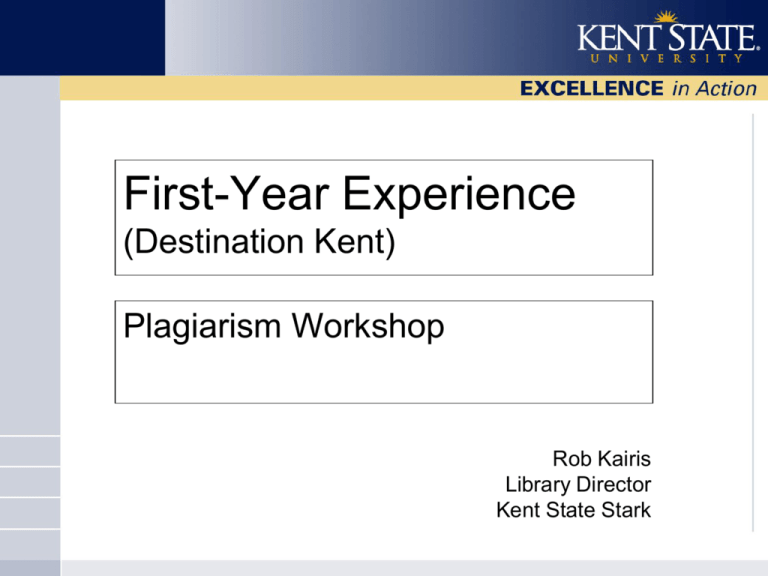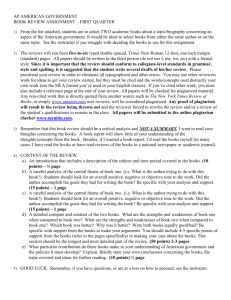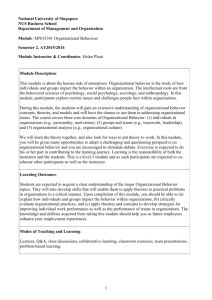Plagiarism 2015
advertisement

First-Year Experience (Destination Kent) Plagiarism Workshop Rob Kairis Library Director Kent State Stark Definition … “To take and present as one's own a material portion of the ideas or words of another or to present as one's own an idea or work derived from an existing source without full and proper credit to the source of the ideas, words, or works.” Kent State’s policy on Cheating and Plagiarism: http://www.kent.edu/policyreg/chap3/3-01-8.cfm Plagiarism Quote … “In fact, Mr. Fitzgerald — I believe that is how he spells his name — seems to believe that plagiarism begins at home.” Plagiarism Quote … “In fact, Mr. Fitzgerald — I believe that is how he spells his name — seems to believe that plagiarism begins at home.” Zelda Fitzgerald “It seems to me,” she wrote in her review, “that on one page I recognized a portion of an old diary of mine which mysteriously disappeared shortly after my marriage, and also scraps of letters which, though considerably edited, sound to me vaguely familiar.” http://www.salon.com/2001/08/25/fitzgerald_9/ Other Famous Plagiarists… Reagan urging Americans to oppose Medicare in 1961: Cruz urging Americans to oppose Obamacare: If you don’t do this and if I don’t do it, one of these days you and I are going to spend our sunset years telling our children, and our children’s children, what it once was like in America when men were free. Freedom is not passed down in the bloodstream from one generation to the next. Every generation has to rise up and defend it, or one day we will find ourselves answering questions from our children, and our children’s children, “what was it like when America was free?” http://comebackdecade.tumblr.com/post/63745521331/cruz-invokes-reagan-attack-on-medicare-to-attack Other Famous Plagiarists… Reagan urging Americans to oppose Medicare in 1961: Cruz urging Americans to oppose Obamacare: If you don’t do this and if I don’t do it, one of these days you and I are going to spend our sunset years telling our children, and our children’s children, what it once was like in America when men were free. http://www.youtube.com/watch?v=NpU-j3k0e_A Freedom is not passed down in the bloodstream from one generation to the next. Every generation has to rise up and defend it, or one day we will find ourselves answering questions from our children, and our children’s children, “what was it like when America was free?” In Context … Although not just college students plagiarize… Expectations depend on how the information is delivered … Speech Newspaper Term Paper Expectation for accuracy and attribution meter If You’re Accused … 1. Your instructor informs you verbally or in writing that he/she suspects you of plagiarizing 2. Your instructor provides you with an opportunity to explain orally or in writing why you believe you did not plagiarize 3. If your instructor still believes you plagiarized he/she may impose sanctions: • Refuse the work submitted for credit • Student gets an F or zero on the assignment • Student fails the class • Request that stiffer sanctions be applied • “Plagiarism School” Plagiarism School … Modeled after Traffic School … Instructor agrees to mitigate sanction if student completes plagiarism school: • review “plagiarized” assignment • university policy • case studies • homework (“spot the plagiarism”) If You’re Sanctioned … The Instructor must report the act of plagiarism and the sanction applied to the Office of Student Conduct The Office of Student Conduct will inform you that you have the right to appeal the sanction by writing to that Office within 15 days of getting their notification of the sanction If you have been successfully sanctioned previously or the instructor or dean request disciplinary sanctions, you must appeal before the Academic Hearing Panel Appeals … If you appeal … A hearing will be scheduled with the Academic Hearing Panel where the instructor must prove you plagiarized You and the instructor can call witnesses and cross exam each other (neither side can be represented by legal counsel) The AHP makes a decision in the matter and provides it to you in writing within 7 calendar days of the hearing Avoiding Plagiarism … • Always do your own work • Be organized (failure to properly attribute someone’s work by mistake is still plagiarism) • When using facts or figures always cite a source (only widely known or accepted facts can be presented without citation—there is no need to cite a source for suggesting that the world is round, for example) • It is okay to seek help or advice, but thoughts, ideas, words, phrases, interpretations etc., should be your own or the source of origin should be properly cited • “Double-dipping” (using a substantial portion of a piece of work for two or more classes without notifying the instructor) is a form of cheating similar to plagiarism • If in doubt, ask for help from your instructor (the Library or the Writing Center) Case Studies … 1. George Bono's paper on AIDS 2. Rosie Pinetar's essay on The Natural 3. Stuart Lavaman's term paper in Geology 4. Gilbert Trout's book report on Slaughterhouse-Five 5. Lonnie Shakespeare trades papers for a Psychology class 6. Jill St. Blonde writes two papers on the same topic Honor Pledge … 1. Signing the pledge is completely voluntary. Students are under no obligation to sign it and will not be penalized in any manner for not signing it. 2. The pledge is not a contract. It serves as a symbolic gesture or statement by each student signing that he or she will not commit an act of academic dishonesty. 3. Although added to the student's official university records, it does not indicate any different treatment. Whether or not a student signs the pledge will have no effect on how a student is treated if accused of an act of academic dishonesty. 4. The pledge is an initiative originating from 2006-2009 Student Advisory Council of the College of Arts & Sciences. First-Year Experience (Destination Kent) Plagiarism Workshop Rob Kairis Library Director Kent State Stark






